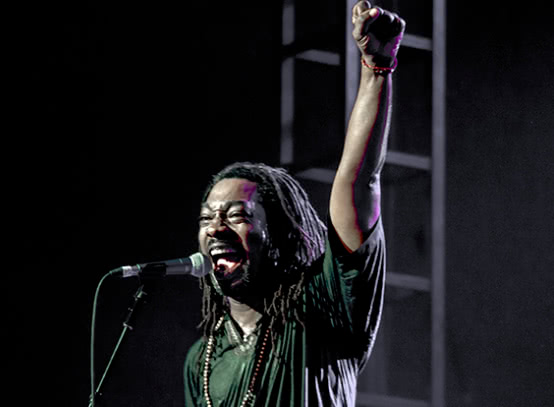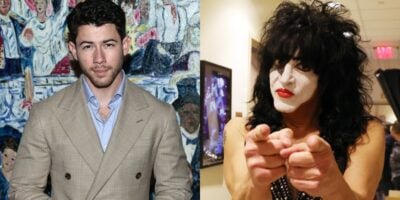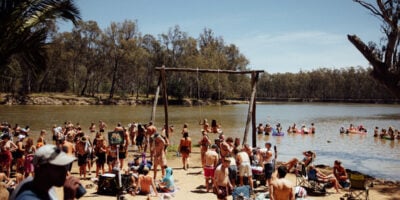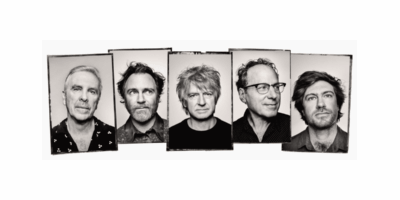In the ocean of Australian music festivals, Bluesfest is the white whale. It’s in a league of its own in terms of size, length, and the genres to which it caters for – not to mention the people it attracts.
There’s something to be said about a music event that allows you to sink into a chair at 10pm while watching an iconic guitarist bend the notes of some of the most recognisable songs of the past 50 years. If this was a different festival, you wouldn’t be allowed to sit, nor would it be possible. But at Bluesfest you can. And it’s encouraged.
Now in its 25th year, the organisers have manufactured a unique display to the Australian market. The difference can be found not only in the lineup, but in the vibe. It’s not aggressive in the slightest; instead, the event is easy and relaxed.
At the north entrance, the smaller stages are crammed together and from a distance the music bleeds in collaboration. People come and go from sets and stages as they please, not because they are bored, but because there’s so much to see.
A nameless bluegrass band plays an impromptu set outside a corn on the cob stall. A lantern parade featuring characters from children’s books parts a sea of people. Mums and dads with deck chairs under one arm and kids under the other stake out vantage points on stage perimeters, while the older folks with blankets are content to sit at the back on the white plastic chairs provided.
As usual, the festival features acts that play multiple sets, one of who is The Charlie Musselwhite Band. This is the kind of act that Bluesfest is built on: traditional blues with an edge of contemporary guitar and Musselwhite himself on the harmonica. A set like this alone feels more primal than what you would see at other festivals. Musselwhite has been plying his trade for more than 50 years and is still touring (albeit with a band of younger musicians). Each song – and accompanying guitar and harmonica solo – is greeted by the crowd with rapturous cheers.
Over at the Mojo stage, the masses are piling in as Edward Sharpe And The Magnetic Zeros begin a country-infused set of indie folk that sees the collective’s penchant for catchy, dramatic tunes laid bare. Singer Alex Ebert has the crowd interaction going from the outset, swapping stories as the show culminates in an audience-assisted chorus of ‘Home’ – a highlight of the festival.
Love Music?
Get your daily dose of metal, rock, indie, pop, and everything else in between.
On record, John Mayer’s ‘The Queen of California’ sounds like middle of the road alt-pop. But when he swaps his acoustic for a Stratocaster during the bridge, the song is transformed and faces are melted. With bravado, charisma, and a mountain of talent, Mayer spends 90 minutes making every guitarist within earshot feel inadequate as he jams out ‘Why Georgia’, ‘Who Says’, and, most notably, ‘Slow Dancing In A Burning Room’, demonstrating exactly why he is considered one of the greatest guitarists of his generation. Mayer closes the first night of the festival with ‘Waiting On The World To Change’ followed by ‘Gravity’.
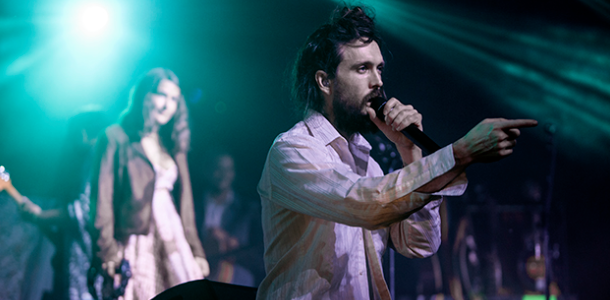
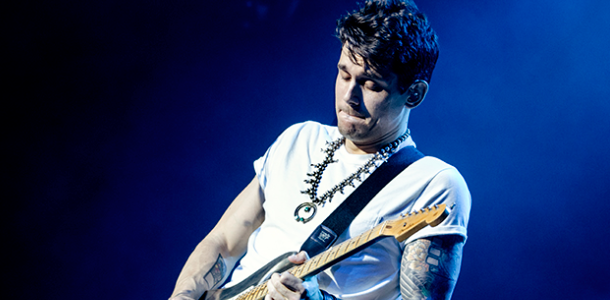
Joss Stone easily pulls the biggest crowd of the afternoon on day two. The sheer volume of punters spilling out of the Crossroads tent makes getting to the stage impossible. Many revert to watching the set on the screens as Stone contrasts her sweet London accent with her immense soulful voice on numbers like ‘Baby Baby Baby’ and ‘Landlord’.
For someone who has dedicated his life to his craft, Buddy Guy sure loves his guitar noise. The legendary musician dissolves into the most glorious storm of guitar squalls and bends the festival has heard. It’s unrelenting throughout the set, and during a final cover of Cream’s ‘Sunshine Of Your Love’ the tirade reaches it’s climax as he drops the guitar multiple times across the stage before playing the final solo with his teeth. The man is 77 years old. Let that sink in.
Matt Corby writes slow-burning, suspenseful rockers, and he does it well. An off-beat addition to the lineup, Corby’s Triple J-backed high rotators ‘Resolution’ and ‘Brother’ are the best received; he holds the massive stage like the professional he is, showing how far he’s come since his star was born on the set of the atrocity that is Australian Idol.
Bands like The Doobie Brothers are hard to come by. Over 40 years old with members all past the age of 60, the band have the enthusiasm of teenagers playing for their friends. The twin drummers dominate the landscape as the four guitarists and keyboardist lining the front rip through the hits with ‘Rockin’ Down The Highway’, ‘China Grove’, and ‘Road Angel’ all making an appearance.
After playing to a more modest crowd the night before, it seems that the secret is out as Saturday afternoon sees New Orleans’ The Soul Rebels fill the tent at the Jambalaya stage. The brass troupe’s reputation for getting the party started precedes them as they launch into a set laden with both the familiar and the original – but always upbeat.
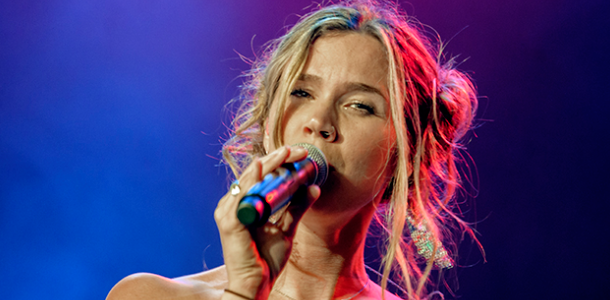
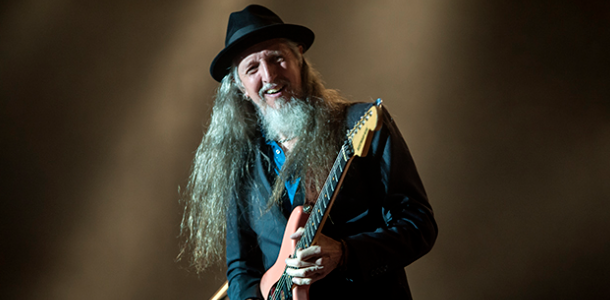
Following Iron And Wine’s restrained, low-key performance at the Mojo Stage, the tent empties until Seun Kuti hits the stage with his Egypt 80 band of 13 players. Kuti leaves nothing in the tank as he dances like a maniacal sign language interpreter while singing his political afrobeat tracks, heightened by energised back-up singers and the occasional saxophone solo from the man himself. Tracks like ‘V.I.P. (Vagabonds In Power)’ and ‘IMF’ and the political messages they hold are lapped up by the crowd who clearly are not expecting such a eclectic set when they settled in to wait for the twin headliners.
Toward the start of his slot, John Butler muses on playing the same festival 15 years ago to a fledgling crowd of just 500. Tonight he plays to between 5,000 and 10,000 with the audience stretching all the way back to the beergarden. As the occasion demands, Butler concentrates mainly on the more bluesy tracks from his new album, but from time to time he breaks into his trademark lighting-fast finger picking on tracks like ‘Oceans’ and set closer ‘Funky Tonight’.
While Dave Matthews Band holds a captive court on the Mojo stage, over at Crossroads a musical masterclass is taking place with Jeff Beck giving lessons. Taking an instrumental only approach – the only mic present is used to say “Yeah, how you doin’, alright?” – the former Yardbird, armed with a pearl white Fender Stratocaster, lays down guitar jams with blues inflections and blazes a course through his history, punctuating the evening with goosebump inspiring covers of Jimi Hendrix’s ‘Little Wing’ and the untouchable ‘A Day In The Life’ by The Beatles.
The following afternoon, Chali 2na takes the same stage to a smaller crowd that would quadruple in size by the end of the set. With more than his fair share of charisma and confidence, the popular Jurassic 5 member interacts with the room, constantly bringing the energy in the tent to another level before performing the emotionally charged ‘Righteous Way’. The huge response to the song about his son reduces the rapper to tears before he closes out proceedings with another free-flowing, bass-heavy banger.
“When you sing songs that you mean, you can get a little overcome sometimes,” Tim Rogers tells the crowd moments after pulling the pin on his song, ‘Paragon Café’ and providing one of the more human moments of the festival. Rogers quickly recovers, however, and dressed for the occasion in a beige three-piece suit and competing with noise pollution from the nearby Juke Joint stage, the artist assures his loyal fans that “this cult icon” will keep going – because he needs his beer money. And, acoustic in hand, keep going he does, interspersing his solo works with several cuts from the You Am I cannon including, ‘Please Don’t Ask Me To Smile’, ‘If We Can’t Get It Together’, and crowd-pleaser ‘Heavy Heart’.
When KC And The Sunshine Band tells 5,000 people to clap their hands, they clap their hands. The Crossroads tent is transformed into a 70s discothèque as songs like ‘Rock Me Baby’ and ‘That’s The Way (I Like It)’ ring out. Harry “KC” Casey is remarkably light on his feet, twirling and samba-ing around the stage for over an hour as his 13 bandmates keep the disco beats flowing before he takes to the keyboard himself for the finale of ‘Get Down Tonight’.


Loudly strummed guitars and indie-country melodies fill the Crossroads tent moments after 20-year-old Jake Bugg strides out on stage. The ‘buzz-act’ for this year’s festival comes straight off the back of an appearance at SXSW in Texas, and with two highly acclaimed albums under his belt, Bugg has the world at his feet. An accomplished guitarist, Bugg switches axes and styles constantly, changing from country to rock to folk to anywhere in between, never allowing himself to be pigeonholed into any one genre. By the time his single ‘Lightning Bolt’ is rolled out, it’s time to retreat to the Mojo stage where a more seasoned headliner is about to close things out for the year.
With eccentric between-song banter and a thick southern drawl, Dave Matthews has the crowd onside early, easing into ‘Crash Into Me’. Up to this point, the band looks slightly restrained, but during nearly each song that follows, a lengthy jam ensues with guitars, fiddles, bass, drums, and a brass section each vying for centrestage and never threatening to end. Fan favourite, the morbid, ‘Gravedigger’ is brief, but closer ‘Two Step’ is given 15 minutes to expand and envelope the ravenous crowd with one more chaotic all-in solo that the band are known for.
As Dave Matthews winds down his group’s second set of the festival, it’s time to leave the 2014 Bluefest once and for all. While joining the throngs, all dragging themselves along pathways to lowly tents in the distance while notes and songs continue to swirl in the air, it feels like we’ve been part of something quite special – something that you won’t get from any other festival on the map. It’s a feeling to savour.
On the first night, during a moment of hyperbole, one-man-band Seth Lakeman boldly declared, “This is the best Glastonbury ever!” But, if what it all boils down to is the people, with a crowd as diverse and ‘up for it’ as this one, it is hard to argue against the sentiment.































